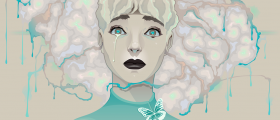
Mood disorders are also often referred to as affective disorders and they include problems which affect the mental health such as mania, bipolar disorder and depression. Mood disorders may affect all humans, from all different age groups. It is not fully understood what exactly causes mood disorders, but it is a fact that they are associated with imbalanced neurotransmitters. It is normal for the moods of a person to change, but mood disorders involve episodes of sudden changes and episodes of mania and depression. Mood disorders can be described by certain feelings and symptoms such as heightened arousal, extreme energy, feelings of grandiosity, mania, trouble engaging in daily relationships and tasks, difficulty concentrating, irritability, changes in appetite, fatigue, suicidal thoughts, guilt, inadequacy, helplessness, hopelessness and sadness.
Symptoms
Symptoms of mood disorders are always related to the feelings of a person. The most common symptoms of mood disorders may or may not include unexplained weight loss, unexplained weight gain, problems interacting with loved ones, loss of interest in daily life, mood changes, irritability, aggression, hostility, guilt, inadequacy, helplessness, hopelessness, sadness, fatigue, difficulty sleeping, difficulty concentrating, changes in appetite and body aches. Heightened mood can be characterized by symptoms such as switching conversational topics rapidly, talking fast, racing thoughts, poor judgment, impulsive behaviors, feelings of omnipotence, decreased sleep and abnormally high energy level. There are also certain serious symptoms which may be indications of some life threatening underlying conditions. These symptoms may or may not include suicidal thoughts, inability to care for one’s basic needs, seeing or hearing things that do not exist, wanting to die and being a danger to oneself and others.
Treatments
There are numerous different types of treatment methods for all those who suffer from mood disorders, and most of those methods are basically designed to address one’s negative feelings so that he or she may return to feeling normal and being able to lead a normal life. The most common treatment methods for those who suffer from mood disorders include support groups, psychodynamic therapy, mood stabilizing medicaments, individual therapy, treatment and identification of coexisting conditions, hospitalization, group therapy, family therapy, cognitive behavioral therapy, antipsychotic medicaments and antidepressant medicaments. There are also certain other alternative treatments for patients who suffer from mood disorders and those include transcranial magnetic stimulation, light therapy and electroconvulsive therapy. There are complementary methods which can be used to enhance the aforementioned methods and those may include yoga, massage therapy and acupuncture.














_f_280x120.jpg)


Your thoughts on this
Loading...